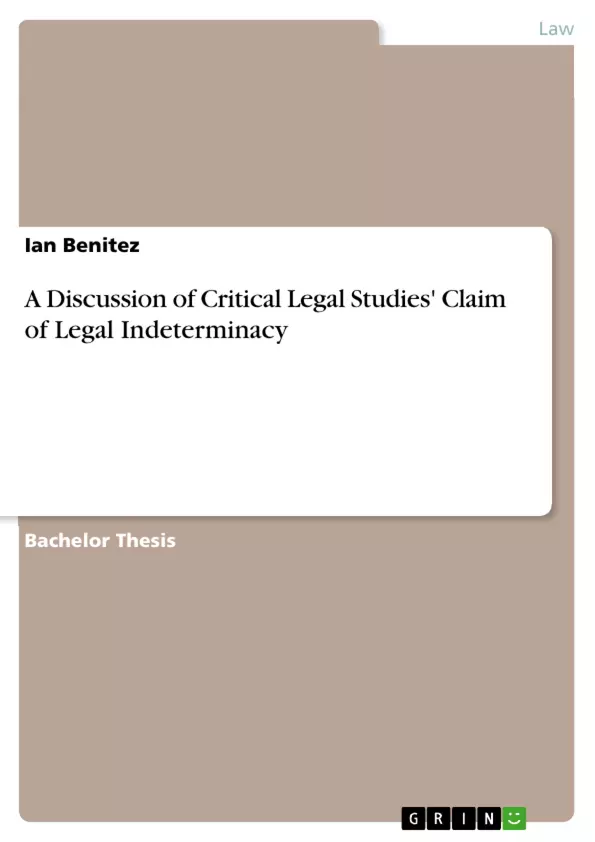
A Discussion of Critical Legal Studies' Claim of Legal Indeterminacy
Bachelorarbeit, 2015
47 Seiten, Note: 1.75
Jura - Rechtsphilosophie, Rechtssoziologie, Rechtsgeschichte
Leseprobe
Inhaltsverzeichnis (Table of Contents)
- Biographical Sketch
- Acknowledgement
- Abstract
Zielsetzung und Themenschwerpunkte (Objectives and Key Themes)
This thesis aims to challenge the Critical Legal Studies (CLS) claim of legal indeterminacy. It utilizes legal formalist logic and language to argue that the CLS claim is rooted in ambiguity and confusion. The thesis refutes CLS assertions by employing sub-arguments focusing on the inherent generality of legal language, reasoned elaboration, and neutral principles.
- Critique of Critical Legal Studies (CLS)
- Legal Indeterminacy
- Legal Formalism
- The Role of Language in Law
- The Relationship Between Law and Politics
Zusammenfassung der Kapitel (Chapter Summaries)
Biographical Sketch: This chapter provides a brief biographical sketch of the author, Ian Carlo Dapalla Benitez, highlighting his academic background, affiliations, and experiences that influenced his interest in legal philosophy. It details his education, involvement in student organizations, and work experience at the UPLB Gender Center, which instilled in him a desire to pursue a legal career. The narrative focuses on his academic achievements and extracurricular activities, providing context for his thesis work.
Acknowledgement: This section expresses gratitude to the author's academic advisor, Prof. Nicolo Masakayan, thesis critic, Prof. John Ian Boongaling, and other thesis committee members for their guidance and support. It also acknowledges the contributions of philosophy professors, the UPLB Sophia Circle, friends, family, and his partner, highlighting the collaborative and supportive environment that facilitated the completion of his thesis. This expression of gratitude contextualizes the thesis's creation within a network of personal and academic relationships.
Abstract: This chapter presents a concise summary of the thesis, outlining its main argument and methodology. It introduces the core concept of legal indeterminacy as claimed by CLS and briefly explains the author's approach to refuting these claims. The abstract serves as a succinct overview of the thesis's central argument and purpose, providing a clear roadmap for the reader.
Schlüsselwörter (Keywords)
law, jurisprudence, philosophy, CLS, critical legal studies, indeterminacy
Frequently Asked Questions: A Comprehensive Language Preview
What is the main argument of this thesis?
This thesis challenges the Critical Legal Studies (CLS) claim of legal indeterminacy. It uses legal formalist logic and language to argue that the CLS claim is based on ambiguity and confusion. The thesis refutes CLS assertions through sub-arguments focusing on the inherent generality of legal language, reasoned elaboration, and neutral principles.
What are the key themes explored in the thesis?
Key themes include a critique of Critical Legal Studies (CLS), legal indeterminacy, legal formalism, the role of language in law, and the relationship between law and politics.
What does the Biographical Sketch chapter cover?
This chapter provides a brief biography of the author, Ian Carlo Dapalla Benitez, detailing his academic background, affiliations, and experiences that influenced his interest in legal philosophy. It includes his education, involvement in student organizations, and work at the UPLB Gender Center.
What is included in the Acknowledgement section?
The Acknowledgement expresses gratitude to the author's academic advisor, Prof. Nicolo Masakayan, thesis critic, Prof. John Ian Boongaling, and other committee members. It also acknowledges the contributions of philosophy professors, the UPLB Sophia Circle, friends, family, and his partner.
What information is presented in the Abstract?
The Abstract summarizes the thesis, outlining its main argument and methodology. It introduces the core concept of legal indeterminacy as claimed by CLS and briefly explains the author's approach to refuting these claims.
What are the keywords associated with this thesis?
The keywords are: law, jurisprudence, philosophy, CLS, critical legal studies, indeterminacy.
What is the structure of the Table of Contents?
The Table of Contents includes: Biographical Sketch, Acknowledgement, and Abstract.
What methodology does the thesis employ to refute the CLS claim?
The thesis utilizes legal formalist logic and language to challenge the CLS claim of legal indeterminacy. It employs sub-arguments focusing on the inherent generality of legal language, reasoned elaboration, and neutral principles.
Details
- Titel
- A Discussion of Critical Legal Studies' Claim of Legal Indeterminacy
- Veranstaltung
- Bachelor of Arts in Philosophy
- Note
- 1.75
- Autor
- Ian Benitez (Autor:in)
- Erscheinungsjahr
- 2015
- Seiten
- 47
- Katalognummer
- V304400
- ISBN (eBook)
- 9783668032583
- ISBN (Buch)
- 9783668032590
- Dateigröße
- 552 KB
- Sprache
- Englisch
- Schlagworte
- law jurisprudence philosophy CLS critical legal studies indeterminacy
- Produktsicherheit
- GRIN Publishing GmbH
- Preis (Ebook)
- US$ 19,99
- Preis (Book)
- US$ 28,99
- Arbeit zitieren
- Ian Benitez (Autor:in), 2015, A Discussion of Critical Legal Studies' Claim of Legal Indeterminacy, München, Page::Imprint:: GRINVerlagOHG, https://www.diplomarbeiten24.de/document/304400
- Autor werden
- Ihre Optionen
- Vertriebskanäle
- Premium Services
- Autorenprofil
- Textarten und Formate
- Services für Verlage, Hochschulen, Unternehmen

- © GRIN Publishing GmbH.
- Alle Inhalte urheberrechtlich geschützt. Kopieren und verbreiten untersagt.
- info@grin.com
- AGB
- Open Publishing
Der GRIN Verlag hat sich seit 1998 auf die Veröffentlichung akademischer eBooks und Bücher spezialisiert. Der GRIN Verlag steht damit als erstes Unternehmen für User Generated Quality Content. Die Verlagsseiten GRIN.com, Hausarbeiten.de und Diplomarbeiten24 bieten für Hochschullehrer, Absolventen und Studenten die ideale Plattform, wissenschaftliche Texte wie Hausarbeiten, Referate, Bachelorarbeiten, Masterarbeiten, Diplomarbeiten, Dissertationen und wissenschaftliche Aufsätze einem breiten Publikum zu präsentieren.
Kostenfreie Veröffentlichung: Hausarbeit, Bachelorarbeit, Diplomarbeit, Dissertation, Masterarbeit, Interpretation oder Referat jetzt veröffentlichen!
- GRIN Verlag GmbH
-
- Nymphenburger Str. 86
- 80636
- Munich, Deutschland
- +49 89-550559-0
- +49 89-550559-10
- info@grin.com
-









